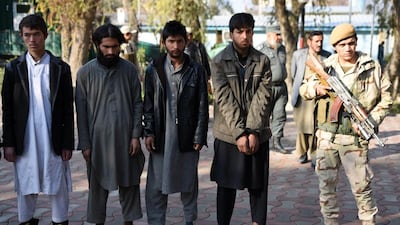KABUL // After running for their lives from ISIL and the Taliban in eastern Afghanistan, a group of elders were gathered together for a rare moment of celebration when the violence caught up with them again.
It was early on the morning of January 17 and they were meeting at a house in the city of Jalalabad to mark the release of a relative held hostage by insurgents for the previous nine months.
As they chatted among themselves, a young man arrived at the front gate and was briefly stopped by the guards on duty. But he quickly broke free and darted into the crowded yard. The explosion that immediately followed shattered any talk of peace.
One image posted on social media after the suicide attack showed some of the elders slumped in their seats against a shrapnel-scarred wall, faces ripped apart by the blast. At least 13 prominent members of the hugely influential Shinwari tribe were killed that day. Many more were injured.
It was just the latest carnage in a brutal turf war between a mixture of the Afghan Taliban, ISIL, fighters from Pakistan and pro-government militias that has been raging in Nangarhar province since last year, sucking the US back into a conflict that was meant to be winding down.
The place worst hit by the violence has been the elders’ home district of Achin, a remote area of mountains, woodland and villages to the south of the provincial capital, Jalalabad.
Malik Osman, a powerful tribal leader, appears to have been the main target of the January 17 attack. The meeting at his family’s guesthouse was celebrating the release of one of his sons, Samiullah, who was killed in the explosion.
Insurgents detained Samiullah in the Spinghar region of Achin. He was then held for two months in Nangarhar’s Lal Pur district before being transferred north to Kunar province where he was kept for around seven months. He was held as a prisoner by Jamaat-ul-Ahrar, a militant faction linked to the Pakistani Taliban, and freed after mediation by elders.
Within an hour of the suicide bombing, Mr Osman was rushed by helicopter to Kabul for treatment to injuries he sustained to his stomach and head. He survived but remains there today in a critical condition. Exactly who carried out the attack is unclear but the Taliban have denied responsibility.
Obaidullah Shinwari is another of Malik Osman’s sons and serves as a provincial councillor for Nangarhar.
He said only “15 or 20 per cent” of Achin is controlled by the government and warned that if his father dies from his injuries, it will “strengthen Daesh”.
The trouble in Achin began to escalate last year after the Taliban tried to prevent a spate of kidnappings by militants allied to ISIL in the neighbouring district of Bati Kot. Heavy clashes ensued, causing some Taliban in Achin to switch sides. The district eventually fell to ISIL after Ramadan.
Since then, the group has destroyed local shrines in accordance with its extremist interpretation of Islam. Villagers have also been issued with ISIL ID cards that effectively act as residency permits.
People who have escaped Achin describe the ISIL fighters as highly organised and well equipped. Their ranks include ethnic Pashtuns and Tajiks from Afghanistan, as well as men of central Asian or oriental appearance.
Nur Mohammed Shinwari’s family fled to Jalalabad because of the growing violence in Achin. His father, Baz Mohammed, attended the January 17 gathering and was killed as a result, dying from his injuries a day later. He was buried in the cemetery of a Jalalabad refugee camp.
“According to our traditions and culture we should bury the bodies of our dead in our own graveyard. But because Daesh is in control we couldn’t take my father’s body there,” he said.
Whoever decided to target the meeting in Jalalabad may have struck a significant blow to on-going efforts to retake the territory lost to ISIL. The injured included Haji Nurajan Shinwari, who was once a commander of a state backed-militia in Achin known as the Local Police.
Prior to the attack, he told The National that the Taliban had joined up with villagers in an attempt to stop ISIL capturing Achin. When their attempt failed and the district collapsed, he fled to Jalalabad.
The violence in Achin continues to escalate as the government, aided by US air strikes, tries to dislodge ISIL. According to a local official, one recent air strike killed an ISIL commander named Sheikh Khalid, who was from Waziristan in Pakistan.
In December, fighters allied to the deputy speaker of Afghanistan’s lower house of parliament beheaded four ISIL militants in Achin in revenge for ISIL beheading four of their colleagues. This was followed on January 13 by a suicide attack on the Pakistan consulate in Jalalabad, for which ISIL claimed responsibility.
The true extent of ISIL’s strength in Afghanistan is the subject of heated debate and many people here accuse the government of playing up the threat in an attempt to keep the international community engaged in the country’s future.
Earlier this month the US state department officially designated the Afghanistan/Pakistan branch of ISIL as a “Foreign Terrorist Organisation”. US president Barack Obama has also given American forces greater leeway to target ISIL in Afghanistan.
In response to the January 17 attack, Afghan president Ashraf Ghani attended a funeral ceremony held by the Shinwari tribe in Kabul this week and has vowed to destroy ISIL. But not everyone is quite so confident.
Haji Ghalib Mujahid, the district governor of Achin, told The National ISIL “have much stronger weapons than us”. He condemned the December beheadings of ISIL fighters and said pro-government forces needed to be more disciplined and better organised.
Plans to put together and possibly train a well coordinated tribal force against the group were on-going, he said.
foreign.desk@thenational.ae

